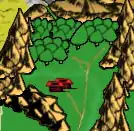Tirasus (3.5e Environment)
Nestled deep in the center of the continent of Loupe, surrounded on almost every side by high mountains, lies a fertile valley of greenery. Tirasus is a lush, slightly hilly region even with it's own forest, if a dangerous one, at that. Just as the region of Tirasus preserves natural life, it preserves it's dangers, as well.
| Capital | |
| Tirasus | |
| Government | |
| Aristocratic Oligarchy | |
| Leaders | |
| 1 High Magistate, 4 Magistrates | |
| Associated Deities | |
| Bestia, Mara, Tirros | |
| State Language | |
| Common, Sylvan, Elven | |
| Diversity | |
| 26% Human, 20% Elf, 13% Orc, 12% Dragonkin, 12% Holstaurus, 11% Merfolk, 5% Catfolk, 1% Dwarf | |
Climate, Geography, and Wildlife
Tirasus, with it's unique environment surrounded by mountains, enjoys relatively fair weather all year round. Showers occur, but rarely in the same level of severity as other regions, and thunderstorms are even rarer. That said, Tirasus is somewhat prone to flooding. Cool, crisp air flows from the north, especially from the Glacial Plains that are directly against the mountain range on the opposite side, while warm air generally lingers from the Ashen plains.
While the Mountainsides surround Tirasus, they do not in the South, leaving the southern pass as the only place that is suitable for ease of travel. Other areas include natural paths through the mountains north, and artificial tunnels to the west and east. The Forest of Shadows, a name given to the forest that is settled in the northern part, stands in the way of the Fungus Pass, a dreaded pass that is always thick with spores of the hundreds of fungi that live there, but in warmer seasons, gives off far more spores, and is poisonous to breathe. The Forest of Shadows, itself, is a rather dangerous place; Filled with all kinds of primordial creatures that run untamed, it is said to be home to the shrine of Bestia, the Aesirean Goddess of the Hunt. It is also home to the occasional druid, barbarian, or insane sorcerer, which make it no more the desirable place to venture.
Wildlife is prolific in Tirasus. From Owlbears, Nymphs, and Monstrous Spiders in the Forest of Shadows to the North, Ettins, Ogres, and Wyverns in the plains, to even the mighty Blue Dragon Hailbrn who nests in the mountains. Tirasus is both majestic, and quite possibly deadly, if you aren't prepared.
History
Tirasus used to be home to only beasts, being one of the last places on earth to be ruled entirely by the laws of nature. It is because of this, that both Druids and Hunters began to settle in the region, eventually forming small tribes. Life in Tirasus was always difficult for such small bands of people, especially when the wildlife was even more ferocious than it is, now. Soon, realizing safety in numbers, and a constant stream of immigrants, both of martial and scholarly professions, the tribes of Tirasus began to unite in order to protect themselves, and deal with the various local disputes that began to occur between factions.
Since these ancient times, Tirasus has been shifting between statuses regarding government, policies, and rule, in general. It is only in recent centuries that Tirasus has finally begun to mature, rooting with the aristocratic system it now employs. The tribes also traditionally favored the people of Sol as they began to take civil talks with them, and the nation as a whole tends to have a wonderful relationship with its desert neighbor, as well.
As the nation of Tirasus began to grow, economical ebbs and flows began to shape the Aristocracy, forming a caste system of sorts. While residents and visitors to Tirasus are rarely forced into any particular class, Nobles, along with their House, are rarely anything but the descendants of Tribal leaders from long past. There are lesser noble houses that are devoted to the greater houses; In these cases, the greater nobles are generally referred to as Barons, or as Magistrates, as mentioned below.
Government
The Nobles in Tirasus generally control all the lands in Tirasus. This dates back to their tribal ancestors staking claims in large parcels of land before finally converging with other tribes to become part of the state. As such, almost all public and private buildings, farm land, and public resources are controlled by one noble house, or another. The problems this could cause have been circumvented by the formation of the Magistrates Council, the effective governing body of Tirasus. Five Magistrates, each representing the parcels of land divided amongst their ancestors, rule over Tirasus through council, with one of the five magistrates being the High Magistrate, determined by the highest level of commerce and military force allocated to them. Each Magistrate rules over their own district, most selecting houses of nobles within their district to act as lieutenants, and to help manage tasks. In respect to the nation, the Magistrates convene in Tirasus, the capital city, every day as long as issues are still present, and consider options on how to deal with them, as well as argue heavily regarding whether these options are satisfactory.
Execution of an order, doctrine, or law always requires the Magistrates to vote. By tradition, the High Magistrate begins the voting process by speaking, "Within our hands lies Tirasus, the lands of our fathers. All those who would shepherd this nation, be resolute: Do ye accept these measures?" When the High Magistrate finishes speaking, all other magistrates vote, speaking in plain voice, before the High Magistrate makes the final vote. None are allowed to abstain. Should a Magistrate not be present for the vote, they are considered to have rejected the measure.
Occasionally, one or more Magistrates may find particular objection within a measure, but fail to have it blocked, or vice versa. Since Magistrates control large portions of land, and even large portions of the armies that make up Tirasus' military, Civil War can, and does, occur. The rest of the Magistrates, however, are bound by ancient rite to assist the Nation of Tirasus with the ouster of the insubordinate, for which the punishment is death.
Foreign Relations and Military
Tirasus has, since the time of the tribes, found an ally in Sol. The two nations enjoy a rather amicable relationship, even by individual citizens. Even at higher echelons of power, Sol and Tirasus have worked hand-in-hand with each other for most of Tirasus' relatively short time as a nation. Tirasus has warred with the Ashen Coast, but tensions between the two have faded, mostly because of other, more dire issues occuring, and at Sol's mediation, an ally of both nations.
Tirasus' citizens hold no real grudge against any nationality, though they are aligned with Sol, and will fight to defend their ally as well as themselves. They have not warred with many countries, though they have done so with the Ashen Coast and Indus, in the past, the latter at the side of Sol.
The noble houses of Tirasus are much more accepting of talented individuals than any forced uniform of military platoons. While the State has uniformed guards in terms of skill and garb, it is not uncommon to see any number of classes in a full Tirasite War Party.
The Capital City is guarded by the State Guard, which is mostly composed of mageknights, clad in heavy plate and using bastard swords. Often, these elite guards have dual training in the ways of Duskblades, or Spellbreakers, and thus are able to master both steel and magic.
Language, Religion, and Culture
Tirasus is a culturally diverse nation, owing to the fact that it was not only made up of different tribes, originally, but since has still swelled with Immigration from all borders. That said, Tirasus generally only respects Common, Sylvan, and Elven at the state level, given the high proportions of each in the capital and abroad. It is not uncommon to hear Giant and Undercommon, as well, however. Religion tends to follow the same suit, as does Culture, each small segment of the population valuing different deities, customs, and ideals. This can cause trouble, at times, but often enough, the residents of Tirasus have learned to adopt a policy of "To each his own," in most areas of life.
Cities
Tirasus, Capital of the Tirasus Region
Located in the center of the country, and slightly southeast, this is the seat of the region; Tirasus is home to one of the largest civilized populations on the planet, second only to Sol and Goldengate. Generally, buildings furthest out from the center of the city are built of wood, and moving in, you begin to see more and more elaborate stonework, detailing the quartering of the cities population, from commoners to the nobility. The center of town yields an elaborate town square, which somewhat contradictory, is a large circle. The center of the circle has a fountain, crested by a silver statue of the great goddess Bestia, standing atop a dire lion. This is also where the Hall of Magistrates is located, directly north from the fountain, as well as where a number of small shops set up along the outer areas.
Southpass
Located directly between the two mountain ranges that encircle Tirasus, this town serves as a rest stop and entrance into the nation, holding a sizable garrison to deter invasions, as well as a moderate population, formed by immigrants who did not migrate all the way into the capital. It's status shifts often, and is always changing economically.
Undine's Crossing
Recognized as a city under Tirasite rule, this settlement was actually founded by Merfolk independently, but later annexed. Located directly East of Tirasus, and north, northeast of Southpass, the crossing is nestled between a river and the mountains. During the summer, the areas dries and becomes considerably like a sloped plain, but during wetter seasons, the Merfolk living here enjoy a lake that forms beneath the level of their homes. The settlement is so named for the Aesirean goddess of Merfolk, Undine.
Other Notable Sites
- Shadow Forest, A dangerous and dark place, possibly the only untamed place in the world. Few but barbarians, druids, and mad sorcerers enter here... or worse, live here.
Back to Main Page → 3.5e Homebrew → Environments
Back to Main Page → 3.5e Homebrew → Campaign Settings → Tirr Campaign Setting


